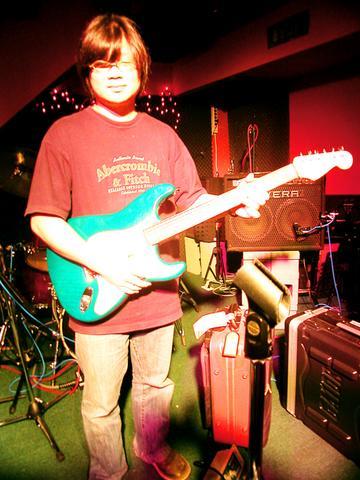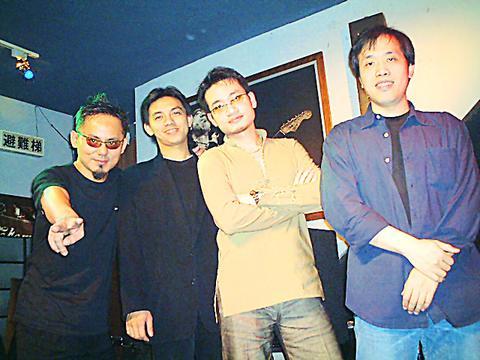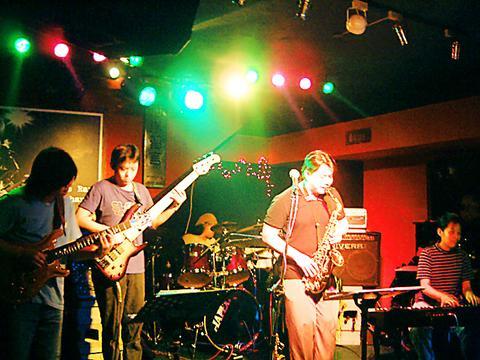It's not easy being a jazz pioneer in a city like Taipei, but Geddy Lin (
The guitarist and club owner is found looking after business at his hangout on Roosevelt Road, trying to talk above the music. ("I like it loud," he shouts) and keeping an eye on a band he's been mentoring.
It's about 11:30pm and around 50 people cluster around in the basement of the cozy, soft-lit club, most of them students or friends of the band. Sitting around tables or leaning against the bar, they seem to be listening intently to the music, some with their chins on their hands. The band isn't bad and business is brisk.

PHOTO: JULES QUARTLY, TAIPEI TIMES
Not bad for a Tuesday night in SARS-affected Taipei. On Fridays and Saturdays, Riverside will be heaving, as a guest group, or one of the many house jazz bands the place has spawned, takes to the stage.
Everyone wants to talk to Geddy, so he takes the phone someone puts in his hand and manages to hold a conversation despite the noise. He asks for drinks from the waitress and says that it has taken three years of work for him to build up business.
Now, he has a successful club that plays his favorite music, despite the fact that jazz is a musical genre for a discerning few in Taipei and not many more outside the city. He also has a 24-track recording studio, a bar, restaurant and nascent record label. His day jobs include teaching, performing as a studio artist on mainstream rock and pop albums (most recently for Stef Sun (Su Yanzi, 孫燕姿) and touring.

PHOTO COURTESY OF RIVERSIDE CAFE
"Yeah, I know that jazz isn't popular," he says and gestures toward the band and around the club. "That's why I built this. I couldn't find a place when I came back here [from studying in the US]. So, I wanted to create a showcase for jazz. It's really hard to find a stage in Taiwan."
Ten years ago he was a rock musician, a singer and guitarist who released two albums. But unlike some other local ex-rockers, who have turned to electronica, or gone pop and then bust, he was saved, by Pat Metheney in concert. "He totally changed my mind ... I just went, `Wow!'" Geddy says of that defining moment.
Now in his mid-30s, Geddy is evangelical about jazz. "It gets people high in a spiritual way. I like to joke that rock is for preachers, jazz is for teachers," he says and explains that he studied music at National Taiwan University and abroad at the Musician Institute B.I.T. in Hollywood. "I learned to appreciate jazz."

PHOTO COURTESY OF RIVERSIDE CAFE
"Most people have no idea of jazz. For them, music's like an entertainment, it's not so serious. Jazz is hard to listen to, but the point of making them listen is to appreciate the music."
His approach to jazz is partly technical and academic as a result of his training, and he has a theory that it plugs into a universal language of emotional highs and lows.
He has tried to fuse traditional Chinese instruments and melodies with jazz, but with mixed success. He says the Chinese pentatonic scale (five-notes) is hard to combine with the Western scale (seven notes). "I'm Taiwanese, so I want to express myself in my language," he says in good English. "Jazz is primarily an American or European language and it's hard to put the two together."

PHOTO COURTESY OF RIVERSIDE CAFE
He also says that without a long or particularly strong tradition of jazz in Taipei it is still hard to build and maintain a scene that can support its musicians. "We want to produce original music, new jazz, and not just copy."
The Riverside is open seven days a week and every night features original programming. From the popular open-jam night on Monday, to indie bands on weekdays, to his jazz showcases on the weekend, Geddy insists that the musicians play their own compositions.
This is what separates his club from the few others that have managed to stay open. "We make our own music, original jazz," he says and then adds, "And we put a lot of money back into the business with the technical equipment." He gives a tour of the recording studio, points to the stage monitors and grins. "Good quality, loud, good for guitarists."
He says he has been lucky with the club because his wife and others take care of the business side of things, allowing him to blaze his pioneering trail in the relative jazz wilderness of Taipei.
This month the Riverside is featuring a small month-long festival highlighting the city's youngest and finest jazz players, many of them Geddy's friends. Delta on the Main Street is a band he used to play in, that plays funk n'jazz fusion, with Xiao Bai (小白) on drums, Brian Chiu (邱培榮) on bass, Fred Lui (呂聖斐) on keyboards and Jeff Yen (嚴和邦) on guitar.
His own band, J.E.G. is part homage to the sounds of Chick Corea and, of course, Pat Metheney in the 1970s to 1990s. Super Trio includes Chris Pao on piano, Taneki from Japan on bass and Rich Hung on drums.
Also lined up are the twelve-piece Combo Band, fusion group GFP, Diamond Vehicle, LISA and others.
Information:
For details of the upcoming Riverside Jazz Festival, call (02) 2368 7310. Or log on at www.riverside.com.tw. Riverside is at B1, 2, Lane 244, Roosevelt Rd. Sec 3, Taipei (

May 11 to May 18 The original Taichung Railway Station was long thought to have been completely razed. Opening on May 15, 1905, the one-story wooden structure soon outgrew its purpose and was replaced in 1917 by a grandiose, Western-style station. During construction on the third-generation station in 2017, workers discovered the service pit for the original station’s locomotive depot. A year later, a small wooden building on site was determined by historians to be the first stationmaster’s office, built around 1908. With these findings, the Taichung Railway Station Cultural Park now boasts that it has

Wooden houses wedged between concrete, crumbling brick facades with roofs gaping to the sky, and tiled art deco buildings down narrow alleyways: Taichung Central District’s (中區) aging architecture reveals both the allure and reality of the old downtown. From Indigenous settlement to capital under Qing Dynasty rule through to Japanese colonization, Taichung’s Central District holds a long and layered history. The bygone beauty of its streets once earned it the nickname “Little Kyoto.” Since the late eighties, however, the shifting of economic and government centers westward signaled a gradual decline in the area’s evolving fortunes. With the regeneration of the once

The latest Formosa poll released at the end of last month shows confidence in President William Lai (賴清德) plunged 8.1 percent, while satisfaction with the Lai administration fared worse with a drop of 8.5 percent. Those lacking confidence in Lai jumped by 6 percent and dissatisfaction in his administration spiked up 6.7 percent. Confidence in Lai is still strong at 48.6 percent, compared to 43 percent lacking confidence — but this is his worst result overall since he took office. For the first time, dissatisfaction with his administration surpassed satisfaction, 47.3 to 47.1 percent. Though statistically a tie, for most

In February of this year the Taipei Times reported on the visit of Lienchiang County Commissioner Wang Chung-ming (王忠銘) of the Chinese Nationalist Party (KMT) and a delegation to a lantern festival in Fuzhou’s Mawei District in Fujian Province. “Today, Mawei and Matsu jointly marked the lantern festival,” Wang was quoted as saying, adding that both sides “being of one people,” is a cause for joy. Wang was passing around a common claim of officials of the People’s Republic of China (PRC) and the PRC’s allies and supporters in Taiwan — KMT and the Taiwan People’s Party — and elsewhere: Taiwan and